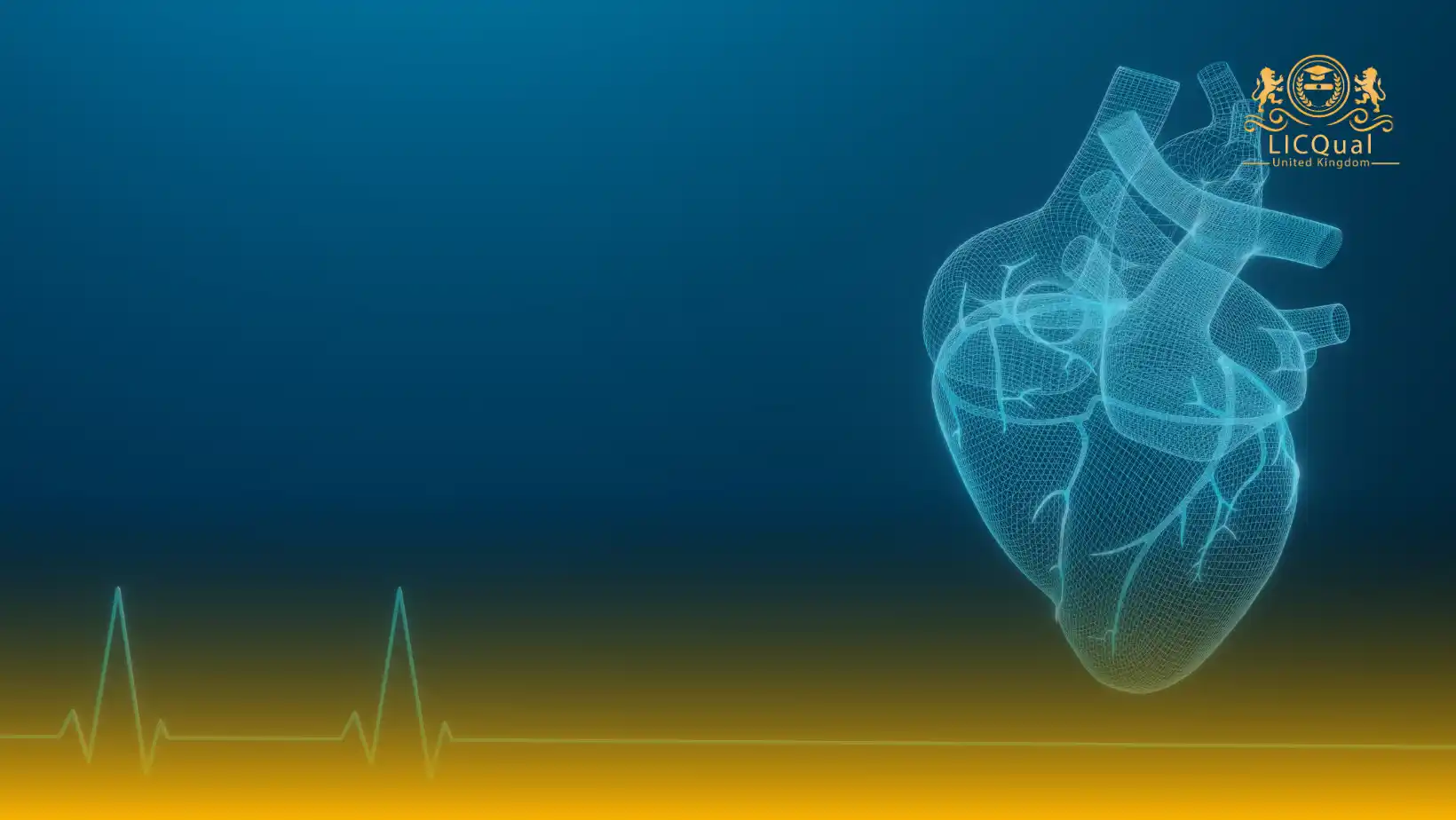The LICQual Level 7 Postgraduate Diploma in Cardiology (PgDC) is a specialised qualification designed for healthcare professionals seeking to advance their expertise and career within the field of cardiology. This postgraduate diploma is tailored for individuals who already possess a strong foundation in medical or healthcare practice and are looking to deepen their knowledge, enhance clinical skills, and achieve recognised Continuing Professional Development (CPD).
This course equips learners with advanced understanding of cardiovascular diseases, diagnostic techniques, patient management strategies, and the latest innovations in cardiology treatment. Through a combination of theoretical knowledge and practical application, learners develop the capability to make informed clinical decisions, improve patient outcomes, and contribute effectively to multidisciplinary healthcare teams.
Centres offering this Level 7 qualification must adhere to strict standards, ensuring that learners receive high-quality training. This includes employing competent and qualified staff, providing access to comprehensive learning materials, and maintaining resources that support both theoretical learning and practical application. By meeting these standards, centres ensure that learners are well-prepared to excel in advanced cardiology roles and integrate new skills into their professional practice.
Whether aiming to specialise further, take on leadership responsibilities, or enhance clinical decision-making in cardiology, the LICQual Level 7 Postgraduate Diploma in Cardiology offers a structured and internationally recognised pathway for professional growth. Learners completing this programme gain not only advanced academic knowledge but also the practical confidence required to succeed in high-level cardiology practice.
Course Overview
Qualification Title
LICQual Level 7 Postgraduate Diploma in Cardiology (PgDC)
Total Units
6
Total Credits
120
GLH
600
Qualification #
LICQ2200957
Qualification Specification
To enroll in the LICQual Level 7 Postgraduate Diploma in Cardiology (PgDC), applicants must meet the following criteria:
|
Qualification# |
Unit Title |
Credits |
GLH |
|---|---|---|---|
|
LICQ2200957-1 |
Advanced Cardiovascular Anatomy & Physiology |
20 |
100 |
|
LICQ2200957-2 |
Diagnostic Cardiological Techniques |
20 |
100 |
|
LICQ2200957-3 |
Interventional Cardiology and Therapeutics |
20 |
100 |
|
LICQ2200957-4 |
Heart Failure and Complex Cardiovascular Disorders |
20 |
100 |
|
LICQ2200957-5 |
Cardiovascular Research Methods and Evidence-Based Practice |
20 |
100 |
|
LICQ2200957-6 |
Advanced Cardiac Care and Leadership in Cardiology |
20 |
100 |
By the end of this course, learners will be able to:
Unit 1: Advanced Cardiovascular Physiology and Pathophysiology
Upon successful completion, learners will be able to:
- Critically analyze the structure and function of the cardiovascular system at a cellular, tissue, and systemic level.
- Explain the pathophysiological mechanisms underlying common and complex cardiovascular diseases.
- Interpret advanced cardiovascular data, including hemodynamic measurements and electrophysiological recordings.
- Evaluate the clinical significance of physiological changes in disease progression.
- Integrate theoretical knowledge into evidence-based clinical reasoning for patient care planning.
Unit 2: Diagnostic Cardiological Techniques
Upon successful completion, learners will be able to:
- Demonstrate advanced proficiency in the interpretation of ECGs, echocardiograms, cardiac MRI, CT angiography, and other diagnostic tools.
- Critically assess the suitability, accuracy, and limitations of various cardiological diagnostic methods.
- Apply clinical guidelines to determine appropriate diagnostic pathways for complex cardiovascular conditions.
- Synthesize diagnostic findings to support differential diagnosis and treatment decisions.
- Evaluate patient safety, ethical considerations, and technological innovations in cardiology diagnostics.
Unit 3: Interventional Cardiology and Therapeutics
Upon successful completion, learners will be able to:
- Critically appraise the principles and procedures of interventional cardiology, including angioplasty, stenting, and device implantation.
- Design patient-specific therapeutic plans incorporating pharmacological and interventional strategies.
- Assess risks, benefits, and contraindications of interventional procedures in complex cardiovascular cases.
- Integrate evidence-based medicine into the management of acute and chronic cardiovascular disorders.
- Reflect on professional responsibilities, ethical considerations, and patient-centered care in interventional cardiology.
Unit 4: Heart Failure and Complex Cardiovascular Disorders
Upon successful completion, learners will be able to:
- Analyze the etiology, pathophysiology, and progression of heart failure and other complex cardiovascular disorders.
- Develop comprehensive management plans for patients with multi-morbid cardiovascular conditions.
- Critically evaluate clinical research to inform decision-making in complex cardiac cases.
- Demonstrate advanced problem-solving skills in diagnosing and managing arrhythmias, cardiomyopathies, and congenital heart diseases.
- Apply interprofessional collaboration principles to optimize patient outcomes in complex cardiac care.
Unit 5: Cardiovascular Research Methods and Evidence-Based Practice
Upon successful completion, learners will be able to:
- Design and conduct high-quality cardiovascular research studies, including clinical trials and systematic reviews.
- Apply advanced statistical and analytical methods to interpret cardiovascular data accurately.
- Critically appraise research literature to identify evidence gaps and inform clinical practice.
- Translate research findings into evidence-based interventions and protocols.
- Demonstrate ethical and regulatory awareness in cardiovascular research and patient safety.
Unit 6: Advanced Cardiac Care and Leadership in Cardiology
Upon successful completion, learners will be able to:
- Lead and coordinate multidisciplinary cardiac care teams effectively.
- Critically evaluate advanced cardiac care models and healthcare management strategies.
- Implement evidence-based policies and guidelines to optimize patient outcomes in cardiology.
- Demonstrate leadership, decision-making, and ethical reasoning in complex clinical scenarios.
- Promote innovation, quality improvement, and professional development in cardiovascular healthcare.
The LICQual Level 7 Postgraduate Diploma in Cardiology (PgDC) is designed for a wide range of learners—experienced clinicians, beginners entering healthcare, and career changers seeking new opportunities. This internationally recognized Level 7 Cardiology qualification equips professionals with advanced knowledge, practical skills, and CPD accredited training to deliver safe, effective, and evidence-based cardiovascular care. Whether you are a doctor, nurse, healthcare practitioner, or someone transitioning into the medical field, this program provides the pathway to success.
1. Medical Doctors and Physicians
- Strengthen expertise in diagnosing and managing complex cardiovascular conditions
- Gain CPD accredited postgraduate training in cardiology
- Expand practice offerings with advanced cardiology services
- Build authority with an internationally recognized Level 7 qualification
- Meet patient demand for evidence-based cardiology treatments
2. Nurses and Mid-Level Practitioners
- Transition into cardiology with structured postgraduate training
- Learn advanced diagnostic and patient management techniques
- Increase career opportunities in hospitals, clinics, and private practice
- Develop confidence in delivering safe and effective cardiovascular care
- Earn a globally recognized diploma to enhance professional credibility
3. Allied Health Professionals
- Diversify practice by adding cardiology expertise
- Master cardiovascular assessment and patient-centered care strategies
- Attract new patients seeking advanced heart health support
- Gain CPD accredited certification for career advancement
- Position yourself as a trusted provider in cardiology care
4. Beginners Entering Healthcare
- Start a career in cardiology with guided, step-by-step modules
- Learn core skills in patient assessment, diagnosis, and treatment planning
- Access internationally accredited postgraduate training without prior specialization
- Build a strong foundation for future advanced qualifications
- Join one of the best postgraduate cardiology courses UK for beginners
5. Career Changers
- Transition into healthcare and cardiology from other industries
- Acquire practical skills in cardiovascular medicine and patient care
- Gain global recognition with a Level 7 postgraduate diploma
- Explore new opportunities in hospitals, clinics, and private practices
- Build a rewarding career in a fast-growing medical specialty
6. International Healthcare Professionals
- Earn a qualification recognized across global healthcare systems
- Access CPD accredited training aligned with international standards
- Strengthen career prospects in cardiology worldwide
- Learn evidence-based techniques for safe patient care
- Expand practice opportunities in both local and international markets
7. Professionals Seeking Academic and Career Growth
- Advance knowledge with evidence-based postgraduate cardiology training
- Strengthen EEAT compliance with authoritative certification
- Gain expertise in cardiology for career progression
- Build credibility with patients and employers through accredited learning
- Position yourself as a leader in cardiovascular education and clinical practice
To deliver the LICQual Level 7 Postgraduate Diploma in Cardiology, centres must meet the following requirements to ensure a high-quality learning environment:
- Qualified Academic Staff: Centres must have experienced and qualified cardiology instructors, clinical educators, or medical professionals with relevant postgraduate qualifications.
- Clinical Facilities: Access to well-equipped cardiac care units, hospitals, or simulation labs to support practical training, diagnostics, and interventional cardiology practice.
- Learning Resources: Availability of up-to-date cardiology textbooks, journals, research databases, online learning platforms, and e-resources to support advanced study.
- Diagnostic and Clinical Equipment: Centres should provide access to ECG machines, echocardiography devices, cardiac imaging tools (MRI, CT), and other relevant diagnostic equipment.
- Research and Laboratory Support: Facilities for conducting clinical research, data analysis, and evidence-based cardiology projects.
- Quality Assurance Systems: Centres must have robust policies for assessment, student support, clinical supervision, and compliance with international postgraduate education standards.
- IT Infrastructure: Reliable internet, e-learning platforms, virtual labs, and telemedicine tools to support blended and online learning where applicable.
- Health and Safety Compliance: Centres must adhere to medical safety regulations, infection control policies, and ethical standards for clinical training.
- Student Support Services: Provision of academic guidance, mentoring, career advice, and continuous professional development (CPD) opportunities.
Assessment and Verification
All units within this qualification are subject to internal assessment by the approved centre and external verification by LICQual. The qualification follows a criterion-referenced assessment approach, ensuring that learners meet all specified learning outcomes.
To achieve a ‘Pass’ in any unit, learners must provide valid, sufficient, and authentic evidence demonstrating their attainment of all learning outcomes and compliance with the prescribed assessment criteria. The Assessor is responsible for evaluating the evidence and determining whether the learner has successfully met the required standards.
Assessors must maintain a clear and comprehensive audit trail, documenting the basis for their assessment decisions to ensure transparency, consistency, and compliance with quality assurance requirements.







